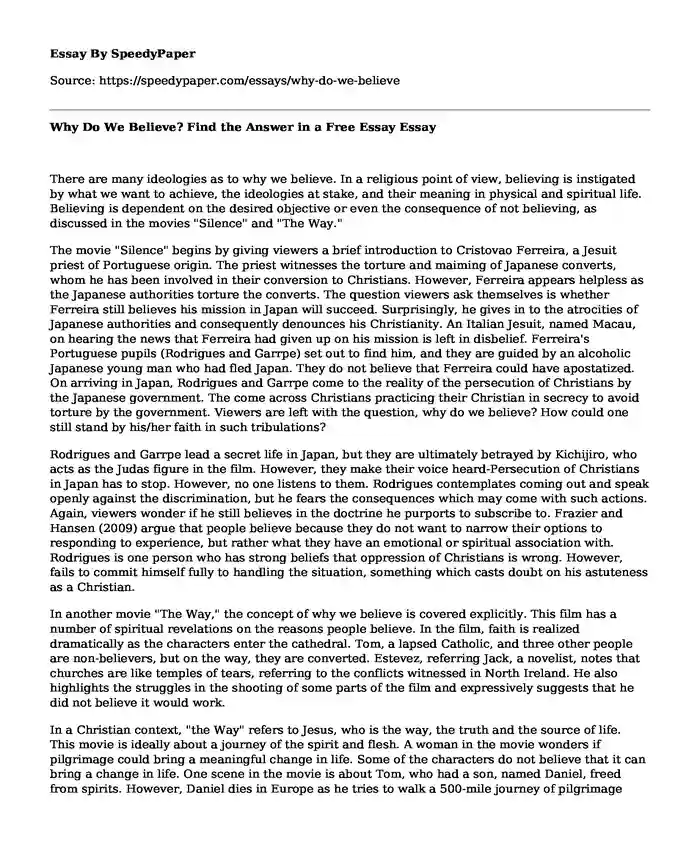There are many ideologies as to why we believe. In a religious point of view, believing is instigated by what we want to achieve, the ideologies at stake, and their meaning in physical and spiritual life. Believing is dependent on the desired objective or even the consequence of not believing, as discussed in the movies "Silence" and "The Way."
The movie "Silence" begins by giving viewers a brief introduction to Cristovao Ferreira, a Jesuit priest of Portuguese origin. The priest witnesses the torture and maiming of Japanese converts, whom he has been involved in their conversion to Christians. However, Ferreira appears helpless as the Japanese authorities torture the converts. The question viewers ask themselves is whether Ferreira still believes his mission in Japan will succeed. Surprisingly, he gives in to the atrocities of Japanese authorities and consequently denounces his Christianity. An Italian Jesuit, named Macau, on hearing the news that Ferreira had given up on his mission is left in disbelief. Ferreira's Portuguese pupils (Rodrigues and Garrpe) set out to find him, and they are guided by an alcoholic Japanese young man who had fled Japan. They do not believe that Ferreira could have apostatized. On arriving in Japan, Rodrigues and Garrpe come to the reality of the persecution of Christians by the Japanese government. The come across Christians practicing their Christian in secrecy to avoid torture by the government. Viewers are left with the question, why do we believe? How could one still stand by his/her faith in such tribulations?
Rodrigues and Garrpe lead a secret life in Japan, but they are ultimately betrayed by Kichijiro, who acts as the Judas figure in the film. However, they make their voice heard-Persecution of Christians in Japan has to stop. However, no one listens to them. Rodrigues contemplates coming out and speak openly against the discrimination, but he fears the consequences which may come with such actions. Again, viewers wonder if he still believes in the doctrine he purports to subscribe to. Frazier and Hansen (2009) argue that people believe because they do not want to narrow their options to responding to experience, but rather what they have an emotional or spiritual association with. Rodrigues is one person who has strong beliefs that oppression of Christians is wrong. However, fails to commit himself fully to handling the situation, something which casts doubt on his astuteness as a Christian.
In another movie "The Way," the concept of why we believe is covered explicitly. This film has a number of spiritual revelations on the reasons people believe. In the film, faith is realized dramatically as the characters enter the cathedral. Tom, a lapsed Catholic, and three other people are non-believers, but on the way, they are converted. Estevez, referring Jack, a novelist, notes that churches are like temples of tears, referring to the conflicts witnessed in North Ireland. He also highlights the struggles in the shooting of some parts of the film and expressively suggests that he did not believe it would work.
In a Christian context, "the Way" refers to Jesus, who is the way, the truth and the source of life. This movie is ideally about a journey of the spirit and flesh. A woman in the movie wonders if pilgrimage could bring a meaningful change in life. Some of the characters do not believe that it can bring a change in life. One scene in the movie is about Tom, who had a son, named Daniel, freed from spirits. However, Daniel dies in Europe as he tries to walk a 500-mile journey of pilgrimage across Spain, mostly referred to the Way of Saint James. This is due to a belief that that James, an apostle to Jesus Christ had his remains interned at the pace and Daniel died trying to reach there. The question believers ask themselves is what really motivates Daniel to believe it was important to walk this journey until he lost his life. Is it because of his struggles in life or a show of faith in Christianity?
In conclusion, there are many reasons why we may believe in a given ideology or context. In these two movies, it is clear that believing in something needs resilience and ability to bear the consequences of insisting on what you believe in, whatever the circumstances.
Works Cited.
Emilio, Estevez. "The Way." (2010)Filmax Elixir Films
Frazier, Royce E., and Nancy Downing Hansen. "Religious/Spiritual Psychotherapy
Behaviors: Do We Do What We Believe To Be Important?" Professional Psychology: Research and Practice 40.1 (2009): 81.
Martin, Scorsese. "Silence." (2016) .ShrpSword Films
Cite this page
Why Do We Believe? Find the Answer in a Free Essay. (2022, May 17). Retrieved from https://speedypaper.com/essays/why-do-we-believe
Request Removal
If you are the original author of this essay and no longer wish to have it published on the SpeedyPaper website, please click below to request its removal:
- The Deadly Passage - Free Essay in History
- Essay Example on the Vanguard International Growth Fund
- Essay Example on Famous Killer in Canada: Allan Legere
- Fraud HSBC Example Free
- Free Essay Example - Becoming a Nurse Practitioner
- Paper Example. People and the Process of Change
- Free Essay Example - New Software for the Insurance Agency
Popular categories





